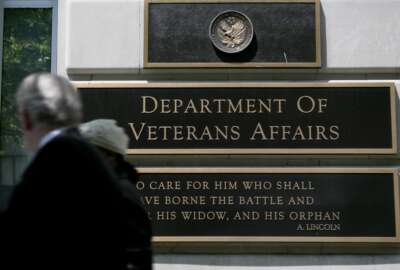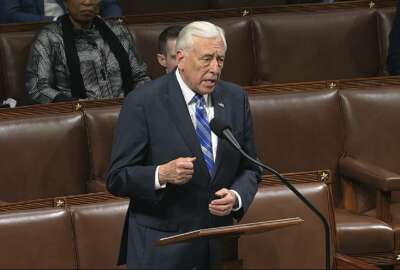
House leaders look to add layer of protection for inspectors general
In today's Federal Newscast, the IG Independence Act would limit the grounds a president has to remove an inspector general.
To listen to the Federal Newscast on your phone or mobile device, subscribe in PodcastOne or Apple Podcasts. The best listening experience on desktop can be found using Chrome, Firefox or Safari.
- House leaders have introduced a bill to protect inspectors general. The IG Independence Act would limit the grounds a president has to remove an inspector general. Those include permanent incapacity, neglect of duty, and gross misconduct. House Majority Leader Steny Hoyer (D-Md.) introduced the bill along with top Democrats on the House Oversight and Reform Committee. The bill comes after President Donald Trump removed several agency IGs from their positions over the course of the coronavirus pandemic. (House Oversight and Reform Committee)
- A group of House members say death benefits should be an option for the families of essential federal workers who die from coronavirus complications. Reps. Max Rose (D-N.Y.) and Jackie Speier’s (D-Calif.) bill would give the families of public and private sector workers a tax-free death benefit should they pass away due to COVID-19. Benefits would got to essential workers in the public and private sectors. Members say the program would be modeled after the September 11 Victim Compensation Fund. The bill has 26 cosponsors. (Rep. Jackie Speier)
- The federal government’s top watchdog says the Defense Department is doing a better job of cooperating with its auditors. The Government Accountability Office usually asks agency leaders to schedule a meeting within two weeks to plan its audits. DoD has had trouble meeting that benchmark in the past. But GAO says Pentagon officials have managed to meet that deadline for almost all of GAO’s most recent audits.
- A new way to determine if your agency’s continuous monitoring program makes the grade. The National Institute of Standards and Technology is giving agencies a way to tell just how effective and complete their continuous monitoring program is. NIST releases special publication 800-173A, Assessing Information Security Continuous Monitoring Programs: Developing an ISCM Program Assessment. The new guide includes a review of strategies, policies, procedures and operations. The program assessment evaluates the continuous monitoring structure and governance rather than its results or technologies. NIST says the assessment approach can be used as presented or as the starting point for an organization-specific methodology.
- Homeland Security has offered its initial thinking on what the future of its First Source 3 contract vehicle will look like. The chief procurement officer and chief information officer released the draft scope of requirements. DHS says it intends to issue First Source 3 as a small business set-aside with five tracks, including one for 8(a) companies, one for women-owned small firms and one for service-disabled veteran-owned companies. The agency plans on holding an industry day in late July to discuss the First Source 3 strategy.
- Presuming the weather and systems hold up, NASA turns a new historical page tomorrow. Wednesday afternoon’s launch will feature a rocket and crew capsule entirely in private hands — Elon Musk’s Space X. For the first time since 2011, the U.S. will launch people to the Space Station from U.S. soil. NASA has already used SpaceX to launch payloads to the Space Station. Presuming a safe return … a U.S. capsule will splash down in the ocean for the first time since the Apollo missions ended in 1972.
- The Air Force removed its minimum height requirement for pilots in order to expand the pool of potential applicants. Previous restrictions stated that pilots needed to be between five foot four inches and six feet five inches. The minimum height requirement was particularly troublesome for women since it disqualified about forty-four percent of them. The Air Force has found ways to help shorter pilots operate safely within cockpits by using special seats.
- Airmen won’t need to prove their fitness to the Air Force until at least this fall. The service announces it is suspending fitness testing until at least October first in an attempt to reduce the spread of coronavirus. Airmen scheduled to conduct their test during the suspension time will receive new test dates. The Air Force previously suspended testing until June 1. In addition, the abdominal circumference component of the test will be put on hold under October 2021. Airmen will get a one year waiver for that part of the test.
- Old and new tools are helping the Department of Veterans Affairs with its coronavirus response. Telework capacity at VA is four times larger today than it was in February before the pandemic. VA had the capacity for 120,000 remote users then. Now, it can support 500,000. Meantime VA launched a new coronavirus chat bot to help veterans with their questions during the pandemic. The new bot is freeing up the phone lines for veterans who need to speak with someone to see a doctor. And a new data visualization tool is also helping the Veterans Health Administration track covid patients, staff, personal protective equipment and beds across the entire VA network. The tool has multiple versions for VA decision-makers and the public. (Federal News Network)
- The Census Bureau reopened offices in American Samoa, the Northern Mariana Islands, Guam and the U.S. Virgin Island islands. Island areas census workers will resume contacting every household and conduct an in-person interview around June 1, the same time 2020 field work will pick up in the rest of the country. The governments of these territories conduct the data collection activities, but the Census Bureau provides the funding, materials and IT infrastructure. So far 60% of households in the U.S. have responded to the census.
Copyright © 2024 Federal News Network. All rights reserved. This website is not intended for users located within the European Economic Area.
Eric White
Eric White is news anchor and Federal Drive producer at Federal News Network.
Follow @FEDERALNEWSCAST
Related Stories
Bob Tobias, Professor in the Key Executive Leadership Program at American University





